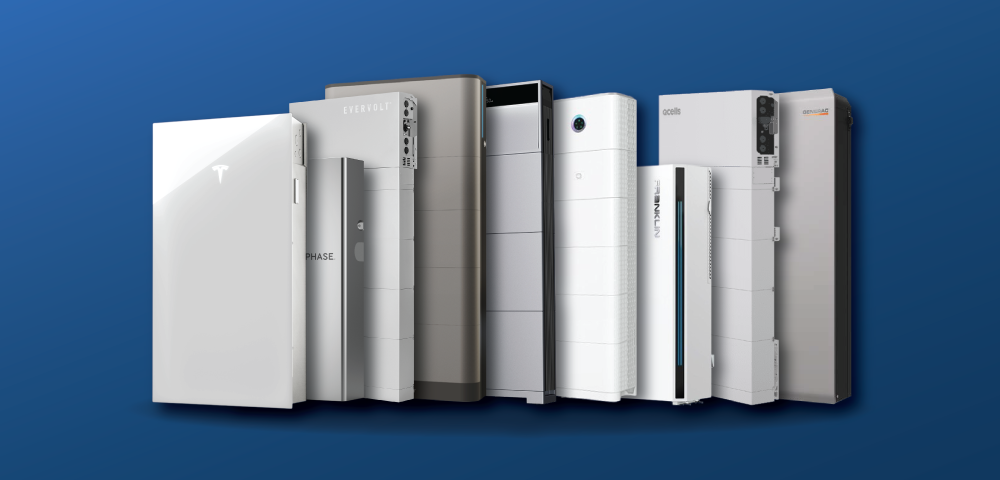Updated 4 weeks ago
Best Solar Battery Backup Systems for Homes in 2025: Choose the Right One for You
Written by Ben Zientara Ben ZientaraBen Zientara is a writer, researcher, and solar policy analyst who has written about the residential solar industry, the electric grid, and state util...Learn more , Edited by Catherine Lane Catherine LaneCatherine has been researching and reporting on the solar industry for five years and is the Written Content Manager at SolarReviews. She leads a dyna...Learn more

Why you can trust SolarReviews
SolarReviews is the leading American website for solar panel reviews and solar panel installation companies. Our industry experts have a combined three decades of solar experience and maintain editorial independence for their reviews. No company can pay to alter the reviews or review scores shown on our site. Learn more about SolarReviews and how we make money.
Getting home energy storage can be a complicated decision, and we advise people to work with a reliable installer to make the right decision for their needs. But there are so many options on the market; how do you know if the installer you’re working with will carry the best brands? That’s where our experts come in.
Here are our picks for the 10 best home solar batteries of 2025:
Rank | Company | SolarReviews rating | Best solar battery |
|---|---|---|---|
1 | Tesla | Elite | Powerwall 3 |
2 | Enphase | Elite | IQ 5P |
3 | Panasonic | Elite | EverVolt |
4 | Canadian Solar | Excellent | EP Cube |
5 | Anker | Excellent | SOLIX X1 |
6 | PointGuard | Excellent | PointGuard Home |
7 | FranklinWH | Excellent | aPower 2 |
8 | Qcells | Excellent | Q.HOME CORE |
9 | Generac | Excellent | PWRcell 2 |
10 | BYD | Very Good | Battery Box HVL |
How SolarReviews Rates Solar Panel Brands
At SolarReviews, we have a thorough and holistic methodology for ranking home solar batteries and the companies that produce them. We don’t just fall for the latest flashy technology that’s advertised everywhere.
We want to make sure we’re recommending the best products to address the needs of modern homeowners, from brands that have the staying power to stand behind those solutions for decades to come.
Our team of experts looks at several factors, including system design and usability, warranty coverage, cost, company financial performance and investment in the U.S., and the opinion of leading companies in the industry. We put all of that together to recommend what we feel are the best long-term solutions for homeowners.
Bottom line on the best solar batteries
A home solar battery should be tailored to your specific energy needs, which means that energy storage systems that can be customized with regard to battery capacity, power output, solar input, and installation location get our highest recommendation.
Here are our recommendations for finding a home solar battery system that fits your needs.
If you live in an average house with natural gas heat and are looking for the best all-in-one solar battery alongside a new solar installation, choose the Tesla Powerwall 3.
If you want the battery with the best warranty coverage from a trusted company, choose the Panasonic EverVolt.
If you want the most affordable battery in our top 10, choose Canadian Solar EP Cube.
If you value sleek design in an ultra-powerful package, choose the FranklinWH Home Power System.
If you want the most future-proof battery, which will be endlessly expandable and someday be able to draw on your EV’s battery capacity, choose the PointGuard Home battery.
Finally, if you want customizability with huge power output, choose the Enphase Energy System with IQ 5P batteries.
That was the bottom line, but there’s a lot more to learn about the best solar batteries for homes in 2025!
10 Best Solar Batteries of 2025
Ultimately, the best solar battery for you will depend on your specific needs. But we would recommend any of the batteries on our top 10 list.
Here’s a rundown of the 10 best solar batteries according to our experts, including why we chose them and their pros and cons.
#1: Tesla Powerwall 3
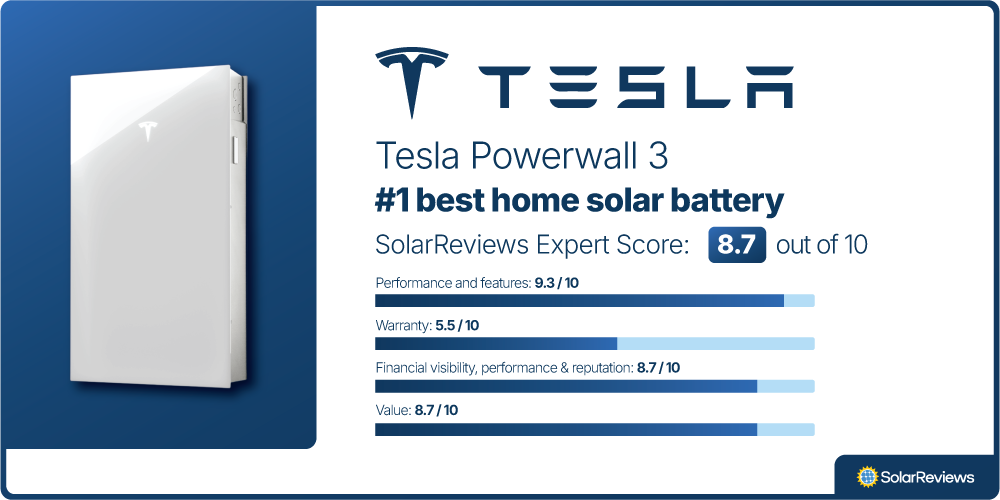
Tesla is often credited with making lithium-ion home storage mainstream thanks to its ultra-sleek, reasonably priced Tesla Powerwall. Now in its 3rd generation, the Powerwall is the most popular home battery on the market, and with good reason!
Powerwall 3 functionality, pricing, and ease of installation make it a top choice for anyone looking for a solar battery.
Why we chose the Tesla Powerwall 3
With a built-in hybrid solar inverter, the Powerwall 3 is the first Tesla battery to connect directly to the DC output of solar panels. The newest Powerwall comes with the same 13.5 kWh of storage capacity but ups the ante with DC expansion packs that can quadruple the energy storage.
On the power output side, Tesla upgraded the Powerwall 3 to 11.5 kW of continuous output, with enough surge power to start large air conditioners. And installers love to work with the Powerwall, citing it as the easiest home battery to install in response to our annual Solar Industry Survey. Finally, the pricing of the Powerwall is among the best on the market.
So, with all this functionality, storage capacity, and industry love at such a great price, the Powerwall 3 deserves the #1 spot in our rankings, but there is just one problem: Tesla CEO Elon Musk is incredibly unpopular with many homeowners, and because of that, they might not consider the Powerwall at all.
If you’re among that group, read all about our top Tesla Powerwall Alternatives. Or check out our full review of the Tesla Powerwall battery if you’re still on team Tesla.
Pros and cons of the Tesla Powerwall 3
Pros | Cons |
|---|---|
Excellent value | Comes in one size |
Very popular with homeowners and installers | Difficult to pair with existing solar systems |
Tesla is a profitable company with over two million American customers |
#2: Enphase IQ 5P
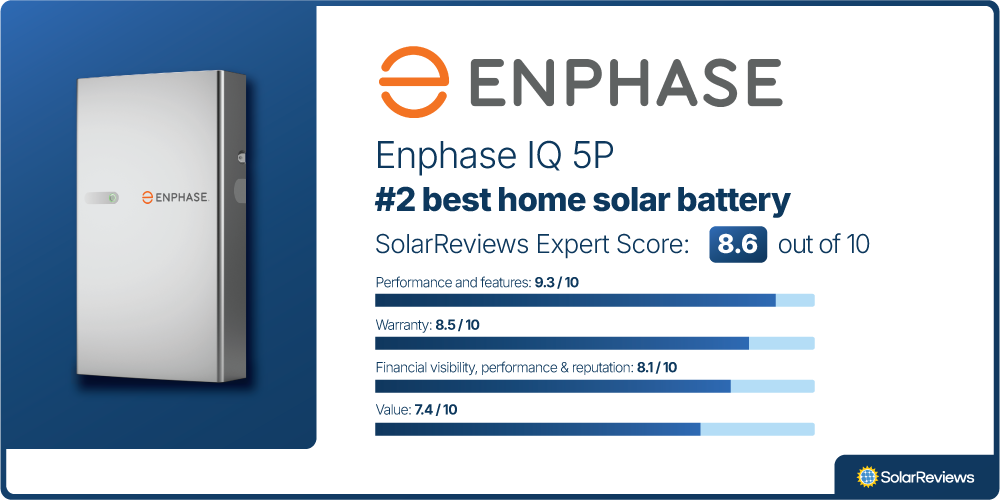
The Enphase Energy System with IQ 5P batteries is our pick for the 2nd best home solar battery of 2025. We’re not the only ones who like Enphase batteries — a whopping 74% of solar installers now install Enphase batteries, according to our 2025 Solar Industry Survey.
The IQ 5P’s power output, design flexibility, 15-year warranty, and popularity among solar installers earned it a high spot in our rankings.
Why we chose the Enphase IQ 5P
The IQ 5P is Enphase's latest battery, offering twice the power output of the company’s previous generation of batteries in a small, modular form factor. Each IQ 5P you add to an Enphase Energy System provides additional energy capacity and power output, making it incredibly versatile.
The IQ 5P can be used with other Enphase components for either home backup power or solar self-consumption without backup, and can be expanded up to eight units in a single system, with 40 kWh of storage and 28.3 kW of power output.
The huge customizability of this system should place the Enphase products near the top of anyone’s shortlist. Read our expert review of the Enphase IQ battery system to learn more.
Pros and cons of the Enphase IQ 5P
Pros | Cons |
|---|---|
Very powerful power output | Expensive |
Brand trusted by more installers than any other | Doesn’t look as nice as other batteries on the market |
Industry-leading 15-year warranty | |
System can be sized to meet your needs and expand in the future |
#3: Panasonic Evervolt Home Battery
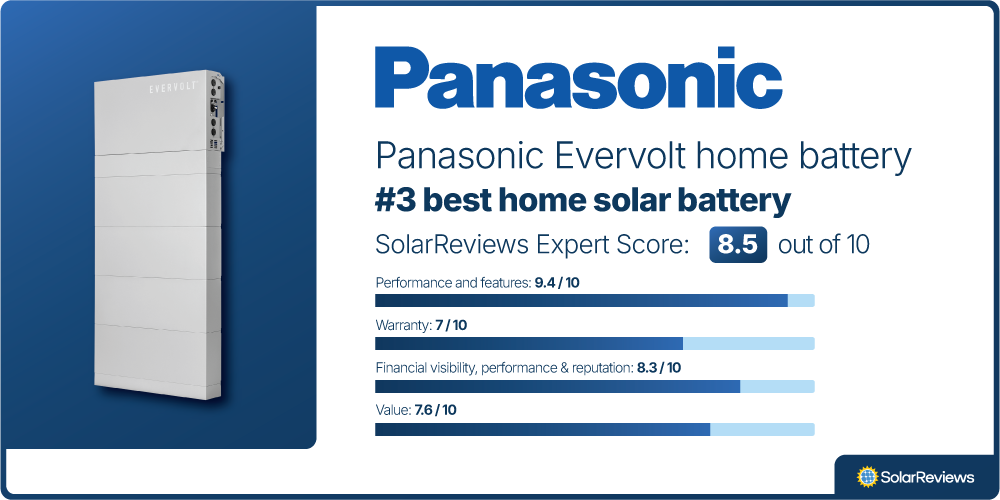
Consumers are no strangers to Panasonic. The popular electronics brand is known for its quality, and its energy products are no different.
The modular Panasonic Evervolt Home Battery system compares favorably with the other batteries in our top five with its design flexibility, allowing homeowners to get precisely what they want out of the system.
Why we chose the Panasonic Evervolt
The EverVolt home battery combines modularity, DC solar input, smart circuit control, and generator backup in a very compelling package, and it’s all backed by a tremendous 12-year warranty from one of the most-trusted brands in the world.
While its power output is limited to 7.6 kW under a single inverter, we think the EverVolt home battery is a clear winner.
Read more in our expert review of the Panasonic Evervolt Home Battery.
Pros and cons of the Panasonic Evervolt
Pros | Cons |
|---|---|
Stackable modular design is easy to install and expand | Output is limited to 7.6 kW unless you add a second inverter/battery stack |
Includes a solar inverter that allows up to 15.2 kW of solar input | Moderately expensive on a per-kWh basis unless you choose the largest size |
12-year warranty is one of the best in the industry | |
Panasonic is a trusted company | |
AC- and DC-coupled models increase flexibility |
#4: Canadian Solar EP Cube
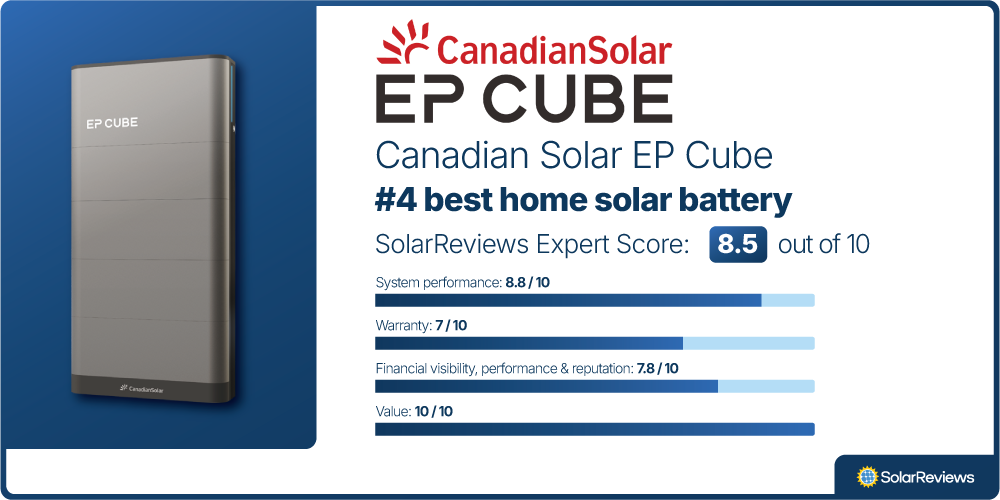
The introduction of the Canadian Solar EP Cube in 2022 was one of the most exciting announcements of the year. The EP Cube carries on Canadian Solar’s tradition of offering great performance at a moderate price point.
This excellent value, warranty, and Canadian Solar’s sterling reputation among installers and financiers earn the EP Cube the fourth spot in our 2025 ranking.
Why we chose the Canadian Solar EP Cube
The Canadian Solar EP Cube is perhaps the best value in home backup batteries. Its ultra-low cost doesn’t sacrifice its tremendous functionality, with up to 19.9 kWh of expandable storage capacity, 7.6 kW of max continuous power output, and a smart gateway with 200-amp passthrough that can connect between utility wires and your home’s main service panel.
In addition, the EP Cube is made by one of the world’s most successful solar panel manufacturers (which earned #1 on our list of the best solar panels for homes). We are also happy to note that the Canadian Solar EP Cube is now eligible for several Virtual Power Plant programs, such as ConnectedSolutions.
Read our full review of the Canadian Solar EP Cube.
Pros and cons of the Canadian Solar EP Cube
Pros | Cons |
|---|---|
Low cost compared to other batteries | Output limited to 7.6 kW unless you add a second inverter/battery stack |
Modular design is easy to install | Not yet as popular as other batteries among installers |
Canadian Solar is one of the most successful companies in the solar industry |
#5: Anker SOLIX X1
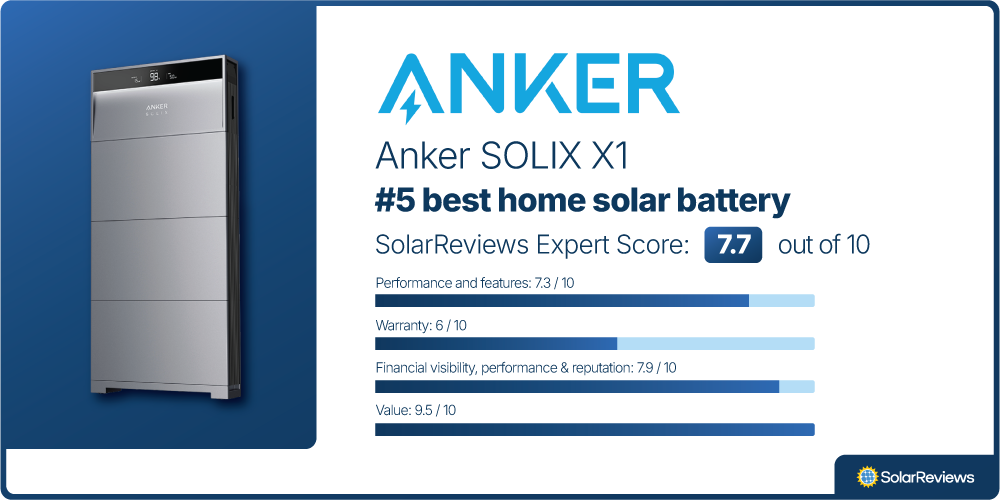
In 2023, popular consumer electronics brand Anker introduced their SOLIX X1 home energy storage system, immediately grabbing headlines (and inking installation company deals) on the strength of its branding, design, and usability.
Now in its second year, Anker is ramping up its efforts to get the SOLIX X1 into homes, and we’re impressed enough with the battery and its parent company’s hustle to award 5th place this year to the SOLIX X1.
Why we chose the Anker SOLIX X1
The first thing you’ll notice about the SOLIX X1 is its looks. Anker’s slim, tall, dark grey battery modules and sleek backlit LED display are certainly eye-catching. However, the SOLIX X1 has some pretty rugged features underneath its beautiful exterior.
The system has active temperature control for its battery modules, allowing them to charge and discharge between -4° and 133° F. In addition, the system design allows for new battery modules to be added years after the original installation, balancing their voltage to allow them to work seamlessly in the system.
Unfortunately, the SOLIX X1 is AC-coupled only, making it best for people who already have a solar system, or who want a backup battery without solar. Anker has developed a new way to handle this, though, and has introduced its own line of microinverters designed to work with the system.
Ultimately, the SOLIX X1’s functionality, aggressive pricing, and good looks are enough to recommend it highly. You can read more in our full review of the Anker SOLIX X1.
Pros and cons of the Anker SOLIX X1
Pros | Cons |
|---|---|
Wide operating temperature range (-4° to 131° F) | Output limited to 6 kW per power module |
Allows new and old battery modules to work side by side | Warranty terms are below industry standard |
Successful company that understands what consumers want |
#6: PointGuard Home
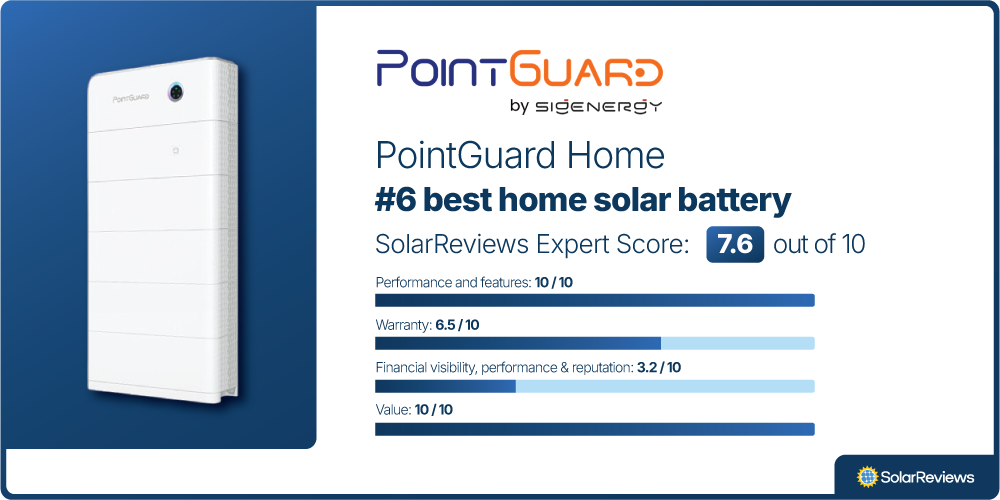
PointGuard is a relatively new company in the U.S., but its worldwide parent company Sigenergy has been making and selling its impressive home energy storage and solar products in Europe for some time.
We’ve been impressed by what we’ve seen from PointGuard, and as the company has expanded into multiple states throughout late 2024, installers are impressed, too.
Why we chose the PointGuard Home Battery
PointGuard Home is essentially a re-badged version of the parent company’s Sigenstor battery, and it offers some incredible functionality, with a great modular design that can incorporate energy storage, a solar inverter, bi-directional EV charging, and some smart circuit control.
Like the Anker SOLIX X1, the PointGuard has a unique design that allows new battery modules to be added alongside older ones as your energy storage needs change over time. That all adds up to a good battery.
Pros and cons of the PointGuard Home Battery
Pros | Cons |
|---|---|
Modular functionality expandable up to 37.62 kWh with 11.4 kW power output | PointGuard is a newer brand on the market, and the company’s financials are private |
Can be installed with new or existing solar panels | |
Bi-directional EV charging will be a game changer once standards are developed |
#7: FranklinWH aPower 2
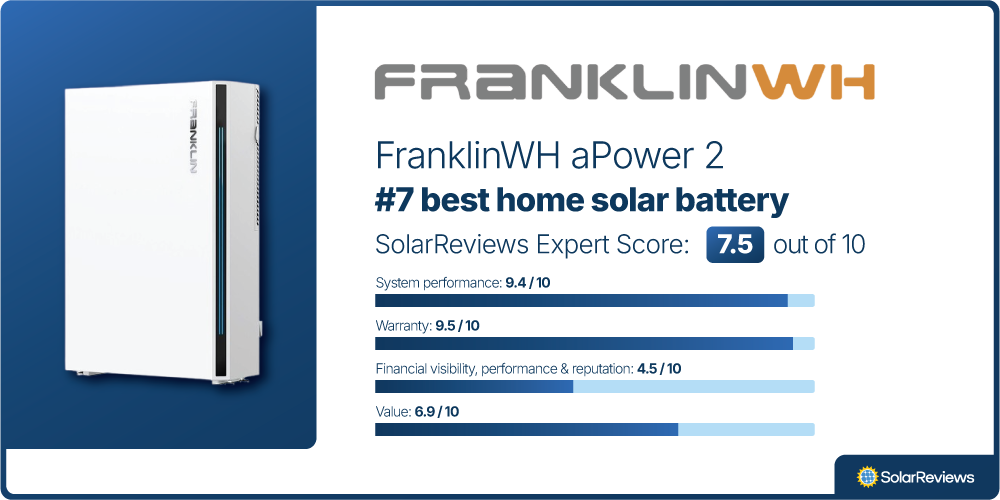
FranklinWH is the fourth most-used battery brand in the solar industry, according to our statistics. The company’s products are very popular among installers and homeowners who can afford a large energy storage system, but we found the company’s original home battery a bit underpowered.
Now, FranklinWH has introduced the aPower 2, which doubles the power output and increases energy storage to 15 kWh per unit. They’ve also announced the aPower S, which adds DC inputs for solar panels, a feature present in the best solar batteries.
Why we chose the FranklinWH aPower 2
FranklinWH’s aPower 2 battery is a powerhouse, outputting up to 10 kW continuous per 15 kWh battery cabinet (meaning power output is doubled for each battery you add). The aPower 2 is installed alongside Franklin’s aGate smart switch, which enables some circuit-level control, generator integration, and "black start" capability, which means it can power your home completely off-grid as long as there is solar or generator input.
In addition, the aPower 2 comes with a newly extended 15-year warranty that allows a huge amount of energy throughput (charge and discharge cycles) over its term. The three things holding FranklinWH back from complete market domination (and the top of our rankings) are its somewhat high price, lack of true modularity, and the fact that the company’s financials are private.
Read our full review of the FranklinWH battery to learn more.
Pros and cons of the FranklinWH aPower 2
Pros | Cons |
|---|---|
One of the most popular batteries on the market | Not truly modular—additional capacity on available in 15 kWh increments |
Huge power output and energy storage capabilities | Company financials are not public |
High-quality products with a long warranty |
#8: Qcells Q.HOME CORE
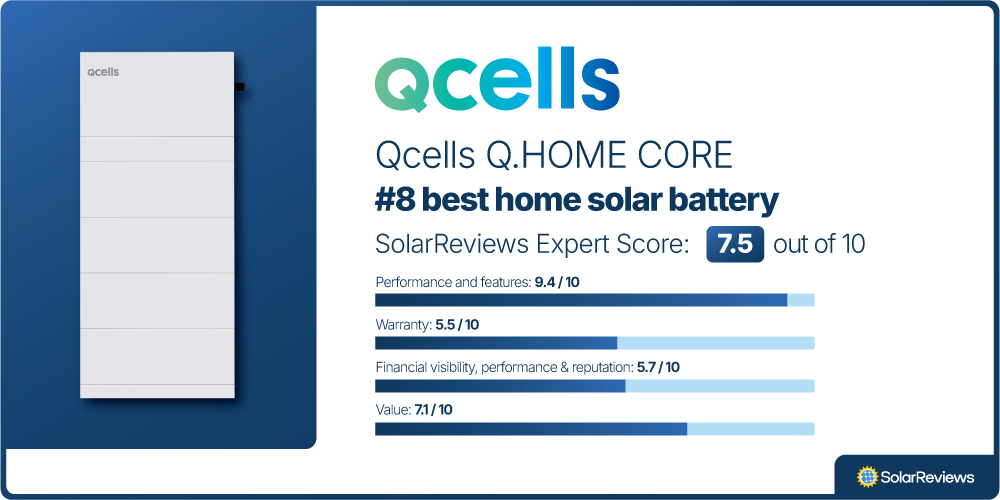
Qcells is another top solar panel brand that entered the battery business. The brand acts as a one-stop shop for homeowners, offering solar panels, batteries, its own solar financing, and even an installation company.
With its modular design and integrated solar inverter, VPP eligibility, and the included Q.HOME HUB backup gateway offering extended benefits, the Q.HOME CORE is a solid option for homeowners who want storage.
Why we chose the Qcells Q.HOME CORE
Like the energy storage systems from Panasonic and Canadian Solar, the Q.HOME CORE is a modular, stackable battery system with a built-in solar inverter capable of 7.6 kW of continuous power output and a total capacity of up to 18 kWh in one stack. Unfortunately, the going price for the Qcells battery seems to be about the same as FranklinWH—a bit higher than the market—but the Qcells battery doesn’t have the WOW factor of the aPower’s output and functionality.
One great benefit of choosing the Qcells battery is the extended ecosystem. Combine the Q.HOME CORE with Qcells panels, and you can even get a discount on financing from the company’s EnFin lending arm. If your installer recommends the Qcells battery, you can be sure you’re getting a good product from a popular brand with a good 12-year warranty.
Read our full Qcells Q.HOME CORE battery review.
Pros and cons of the Qcells Q.HOME CORE
Pros | Cons |
|---|---|
Modular design is easy to install and expand | Higher cost than some competitors |
Integration with other Qcells products, installation, and financing options | Parent company financial performance dipped in 2024 |
12-year warranty terms | |
Qcells is one of the most trusted brands in the industry |
#9: Generac PWRcell 2
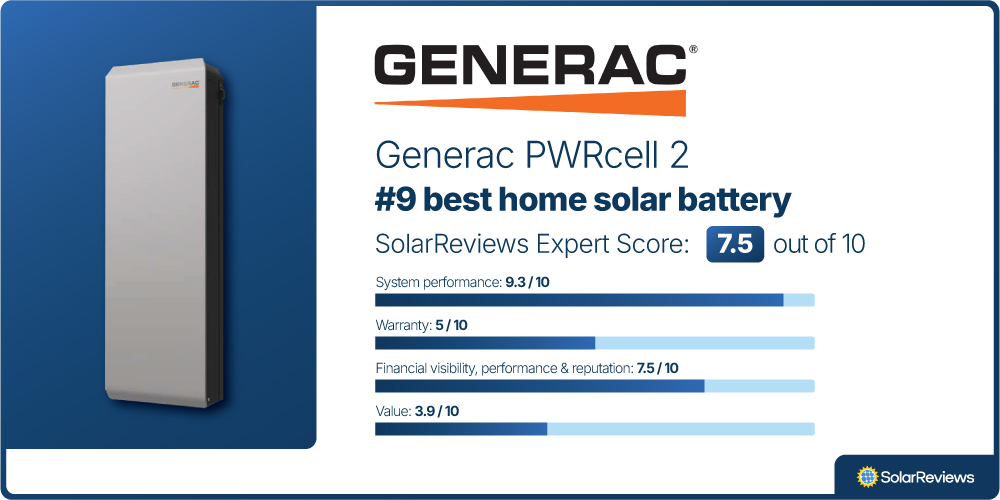
Generac’s original PWRcell batteries were essentially re-badged versions of the batteries produced by Pika Energy, a company that Generac acquired in 2019. The technology used in certain parts of the original PWRcell system had some flaws that caused widespread problems for the company.
To its credit, Generac has been working hard to remedy all issues with the original system, all while developing the PWRcell 2 from the ground up. The company’s newest home energy storage system offers some impressive capabilities and seamless integration with Ecobee smart thermostats.
Why we chose the Generac PWRcell 2
Generac’s PWRcell 2 is a very capable AC-coupled battery, meaning it can be installed alongside existing solar panels or even by itself without solar. Its capacity can be expanded from 9 kWh in a single battery cabinet up to 36 kWh across two cabinets, with a separate inverter for bringing power from the batteries to your home.
Generac’s new Smart Disconnect Switch is installed as part of the system, adding AC solar input and generator input, as well as the ability to set up partial or whole-home backup. The PWRcell system also integrates with Ecobee smart thermostats to allow anyone in the home to see and control the functions of the battery.
Based on the whole Generac home backup power ecosystem, functionality, and Generac’s reputation for good customer service, we recommend the PWRcell 2. Read more about it in our complete Generac PWRcell review.
Pros and cons of the Generac PWRcell 2
Pros | Cons |
|---|---|
Modular expandability up to 36 kWh with power output up to 11.5 kW | Relatively high cost compared to competitors |
Backup generator support | No DC solar input |
Integration with Ecobee smart thermostats |
#10: BYD Battery Box HVL
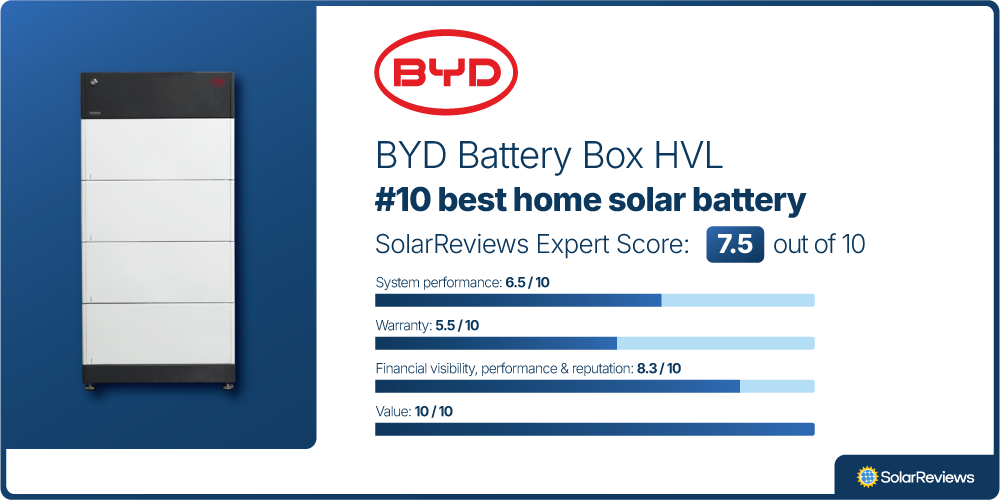
BYD is one of the largest battery manufacturers in the world, and its Battery Box line of stackable home batteries is available all across the globe. The Battery Box HVL is the company’s high-voltage battery entry for the U.S. and Canadian markets. It can be paired with inverters from GoodWe, Solis, and SMA to create an energy storage system that fits your needs.
Why we chose the BYD Battery Box HVL
BYD is known for its super high-quality batteries used worldwide in EVs and energy storage applications. What we like most about the Battery Box HVL is its elegant simplicity and expandability.
The Battery Box HVL system is made up of 4 kWh modular blocks that can be stacked up from the floor in configurations of between three and eight modules, allowing you to customize the amount of energy storage to your needs and even expand it later if your needs change.
Being a Chinese company that manufactures its own battery cells, BYD products are very low cost compared to the competition. That makes them a hit as far as we’re concerned.
Check out our full review of the BYD Battery Box to learn more.
Pros and cons of the BYD Battery Box HVL
Pros | Cons |
|---|---|
Ultra low cost | Must be paired with external inverter |
Highly expandable | Tariff and trade risks because BYD is a Chinese company |
Made by one of the largest battery companies in the world |
Pros and cons of the best solar panel brands
Adding a battery to your home solar installation can be a complicated decision. First, you have to choose if you want backup power in an outage or just enough energy storage to offset some of your evening usage. Then, you have to decide which circuits in your home to back up and how much storage capacity you need.
The home solar batteries on the market differ a lot in how they can perform these functions.
Some are designed to accept DC solar power input, while others connect only to the AC wires from your home’s electrical panel.
Some are modular, meaning their capacity can be expanded easily by adding battery modules under a central inverter and/or management system. Others come in one size only, and you can only expand their capacity by purchasing two or more.
Some come with sophisticated additional functionality, like charging from a backup generator or managing home circuits with smart functionality.
Every battery on our list combines some or all of these functions to meet various needs. While we recommend all the brands on our top 10 list, we prioritize modular batteries that can charge directly from either solar DC or AC output and can be easily adapted to the needs of many different kinds of homeowners.
What factors determine the best solar batteries?
Every person and every home is different, so the best solar battery can change with your needs. You’ll need to know which battery specifications are important and how to evaluate them to find the right solar battery to reach your goals!
Our general advice is to trust expert battery installers to help you decide on the right battery. That being said, there are a few key features you should look for when choosing a solar battery backup system:
Cost
Energy capacity
Power output
Depth of discharge
Battery chemistry
AC or DC coupling
Mounting configuration and IP rating
Warranty coverage
Cost
The price of a solar battery installation is one of the most important things to consider when getting a battery. On average, home energy storage systems can cost between $12,000 and $20,000, but they may be even more expensive depending on the design, features, and battery you choose.
There are battery incentives and rebates available, including the 30% federal tax credit. You can also finance battery installations with personal or solar-specific loans, and some utility and solar companies even offer battery lease programs.
Energy capacity
The storage capacity of a battery describes how much energy it can store, measured in kilowatt-hours (kWh). The capacity gives you an idea of how long a battery can run your appliances.
For example, a 10 kWh battery can hold more energy than a 5 kWh battery, so it can run appliances for longer. The 10 kWh battery could run a refrigerator for 20 hours, while the 5 kWh battery could only run it for 10 hours!
The right battery capacity for you depends on your energy usage and what you’re trying to power with your battery. The more appliances you want to run, the more storage capacity you’ll need.
Most homeowners will be fine with between 10 and 18 kWh of storage capacity, but a solar installer can accurately estimate your storage needs.
Power output
Power output measures how much power a battery can provide at any given time, measured in watts or kilowatts. How much power a battery can release gives you an idea of what appliances you can run, and how many you can run at once.
Each battery has continuous and peak power output ratings.
Peak power output is important because some appliances need a short burst of power to start running, like air conditioners or sump pumps.
Continuous output is how much the battery can release for more than a few seconds.
A professional system designer will help you choose a battery option that matches your appliances' requirements.
Depth of discharge
Depth of discharge (DoD) describes how much of the energy a battery holds can actually be used without damaging the battery’s health.
For example, a battery with 10 kWh of total capacity that only allows 80% depth of discharge really only has 8 kWh of stored energy that a home can use.
Ideally, you should look for a battery with a 100% depth of discharge to get the most out of the battery. But anything above 90% shouldn’t be a deal breaker.
If you can’t find the depth of discharge listed, you can compare the battery’s maximum capacity (the total amount of energy a battery stores) and the usable capacity (the amount of stored energy you can use) to get an idea of the DoD.
Many manufacturers have started listing the usable capacity as the nameplate capacity, meaning you can discharge 100% of the listed capacity. But there is still some capacity reserved to protect the battery’s health.
Battery chemistry
Battery chemistry is very important in home solar batteries today. Today, most home energy storage systems use lithium-iron phosphate batteries. You may also see this written as LFP. LFP batteries are safer and longer lasting than other battery types.
A few home batteries today still use nickel-manganese cobalt (NMC). Sometimes referred to as just lithium-ion batteries, NMC modules are becoming less popular because they contain toxic cobalt and are at a higher risk of catching fire if they’re mishandled.
However, they have a higher energy density, meaning NMC battery banks can store more power in a smaller space.
Lead-acid batteries can also be used as backup storage but aren’t as common because they require regular maintenance and have short lifespans. You’ll mostly see lead-acid batteries paired with off-grid solar systems.
AC or DC coupling
AC- or DC-coupling describes how a battery is connected to your solar panels. All batteries store DC power, but how that happens depends on how the system is designed.
DC-coupled batteries are connected directly to DC solar output and must be installed alongside a hybrid solar inverter to power home appliances, making DC-coupled batteries best for new solar installations. Some DC-coupled batteries include the LG Chem RESU Prime and the Generac PWRcell.
AC-coupled batteries have their own battery inverter that can turn solar power that has already been converted to AC power back into DC power that can be stored. This makes AC-coupled batteries easy to set up with existing solar installations. AC-coupled batteries include the Tesla Powerwall 2 and the Enphase IQ 5P.
Some brands offer both AC- and DC-coupled versions of their batteries, allowing for greater design flexibility. The Panasonic EverVolt and the Qcells Q.HOME CORE have both coupling options.
Mounting configuration and IP rating
Mounting configuration and IP rating affect how and where a battery is installed. Be aware of whether a battery is wall-mounted or stackable from the ground up, and know if it must be installed indoors or comes with an outdoor-rated cabinet with an ingress protection (IP) rating.
You can also look for a NEMA 3R rating, indicating a battery enclosure is resistant to water, rain, inc formation, sleet, and snow. The Tesla Powerwall and Enphase IQ 5P are NEMA 3R rated.
A NEMA 4X-rated enclosure is even more durable, protecting against corrosion, windblown rain and dust, and hose-directed water. The EP Cube and Qcells Q.HOME CORE are NEMA 4X rated.
Solar battery warranty
The warranty is important to understand when investing in battery storage. Most battery warranties have three parts: a coverage term in years, cycle and throughput limits, and a capacity retention guarantee.
Term: The coverage term of a battery warranty is usually listed in years. Almost all solar batteries are covered for ten years. Some battery manufacturers are starting to offer 12 and even 15-year terms. But, if you reach the cycle or throughput limit of the battery before the coverage term, the warranty expires even if there is still time remaining on your warranty.
Cycles or throughput: Home storage batteries lose their ability to hold a charge as they are used. So, the more you charge and discharge, or cycle, your battery, the quicker it ages. To account for this, most battery manufacturers include a cycle or throughput measurement in the warranty. Our top battery brands tend to have 6,000-cycle limits. If you reach your cycle or throughput limit before the term is up, the warranty expires.
Capacity retention: Energy storage warranties typically include a capacity retention guarantee that guarantees that the battery’s capacity won’t fall below a certain level as you use it. Most batteries have a 70% capacity retention guarantee, but some offer 80%. A capacity retention guarantee below 70% is a red flag for us unless the term length is longer (over ten years).
A typical battery warranty will look something like this: 70% capacity guaranteed after the first of 10 years or 6,000 cycles.
Note: A warranty is only as good as the company that stands behind it. That’s why our ranking methodology has a strong preference for companies with a history of financial success that can prove they have the staying power to serve their customers and industry partners for decades to come.
Methodology: Our expert energy battery storage system rankings
SolarReviews’ battery rating methodology differs from other websites because we don’t simply rank performance and cost characteristics. In addition to technical specs, our team of solar experts emphasizes factors that encompass the company's success, which in turn provides long-term benefits to homeowners.
We also consider the value of the batteries on a dollar-per-kWh basis and examine the battery company’s popularity among installers to get a holistic view of which batteries are the best.
Here are the categories and weights of our battery ranking criteria:
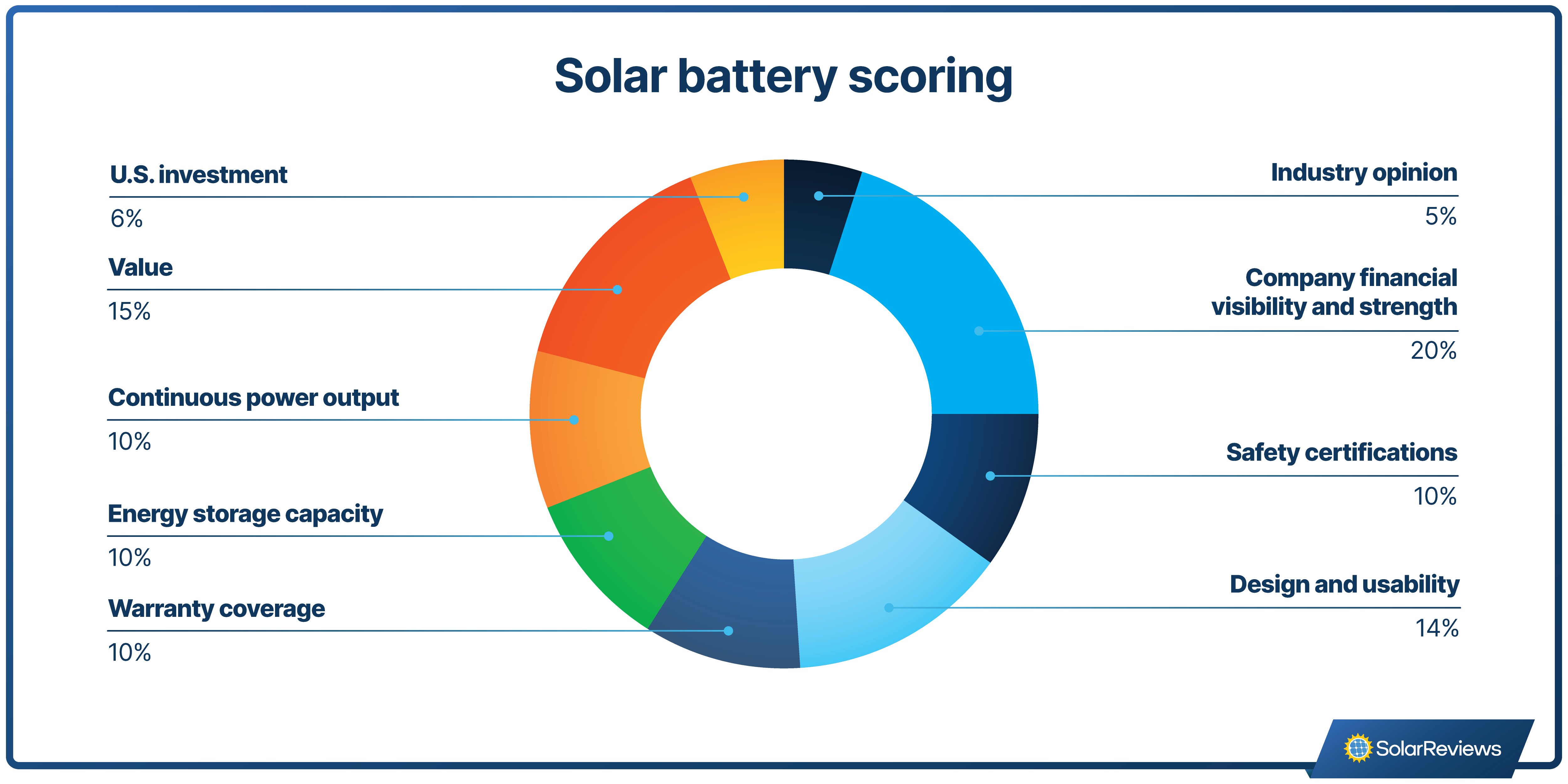
Company financial visibility and strength (20%)
This category offers the most points based on a manufacturer’s financial performance and transparency. Companies are awarded points for being publicly traded, publishing financial statements, and maintaining high revenue and profitability.
Value (15%)
For this category, we evaluate a battery system based on its cost per kWh of storage, including installation costs, but before any incentives. For DC-coupled batteries, we add the cost of a SolarEdge hybrid inverter to the evaluation to fully represent the cost compared to AC-coupled batteries that include their own inverter.
Design and usability (14%)
This category examines a battery’s design flexibility. Points are awarded based on expandability, modularity, indoor and/or outdoor rating, and AC-and/or DC-coupled capability. Virtual power plant eligibility is also considered.
Warranty coverage (10%)
The warranty is an extremely important evaluation criterion when it comes to batteries. Ten years has been the industry standard for a long time, but several companies now offer warranties of 12 years, and Enphase now leads the industry with a 15-year warranty. Companies get points for length and having cycle-life or total energy throughput clauses in their warranties.
Energy storage capacity (10%)
This category represents the total capacity for a typical home battery. In the case of modular batteries, we evaluate using the most common or most functional size for the average homeowner.
Continuous power output (10%)
Here, we look at a single battery’s ability to output continuous power. In the case of modular batteries, we evaluate a battery with the number of modules needed to reach the inverter's maximum output.
Safety certifications (10%)
Safety certifications ensure a product meets certain standards, providing peace of mind for both installers and homeowners. Points were awarded for the presence of specific UL and UN certifications.
U.S. investment (6%)
Our country needs home-grown businesses to bring us into a post-carbon world. This category tracks whether a company has offices or is based in the U.S., manufactures its equipment here, and regularly attends U.S. trade shows and industry events.
Industry opinion (5%)
Data for this category comes directly from our annual Solar Industry Survey. We ask installers which battery brands they will work with and award points weighted by the percentage of the industry that says they will install a company’s products. Full points are awarded to companies with at least 50% of installers saying they choose to install the battery.
Compare the best solar batteries of 2025
Brand/Battery | Estimated cost per kWh* | Storage capacity | Continuous power output | Warranty |
|---|---|---|---|---|
Industry average | $855 | 14.85 kWh | 7.6 kW | 12 years, 4,500 charge/discharge cycles |
Tesla Powerwall 3 | $750 | 13.5 kWh | 11.5 kW | 10 years, 2,800 cycles |
Enphase IQ 5P system (3 modules) | $820 | 15 kWh | 11.52 kW | 15 years or 6,000 cycles |
Panasonic EverVolt Home Battery (4 modules) | $810 | 18 kWh | 7.6 kW | 12 years or 6,000 cycles |
Canadian Solar EP Cube (5 modules) | $550 | 16.6 kWh | 7.6 kW | 10 years or 6,000 cycles |
Ankew SOLIX X1 (3 modules) | $650 | 15 kWh | 6 kW | 10 years or 3,290 cycles |
PointGuard Home Battery (2 8-kWh module) | $580 | 15.6 kWh | 11.4 kW | 10 years or 3,180 cycles |
FranklinWH aPower2 + aGate | $845 | 15 kWh | 10 kW | 15 years or 6,000 cycles |
Qcells Q.HOME CORE | $830 | 15 kWh | 7.6 kW | 12 years, 6,000 cycles |
Generac PWRcell 2 (6 modules) | $995 | 18 kWh | 10.3 kW | 10 years, 2,520 cycles |
BYD Battery Box HVL (4 modules, with Fronius GEN 24 inverter) | $690 | 16 kWh | 10.2 kW | 10 years, 2,525 cycles |
*Does not include installation and labor costs. DC-coupled models include the added cost of a 7.6 kW hybrid inverter
How long do solar batteries last?
Most home batteries are guaranteed to last at least 10 years, but many brands are starting to extend their warranties to 12 or 15 years. Battery warranties typically include a number of discharge cycles or energy throughput, as well.
Batteries will continue to operate after their warranty period. Exactly how long your battery will work depends on its chemistry and how it’s used. For example, a battery that is completely drained more than once a day won’t last as long as one that’s used once a week.
Keep in mind that batteries age and store less energy. Think about your smartphone battery—it probably doesn’t hold a charge quite like it did when you first got it. The same thing happens with solar batteries. Most battery warranties outline how batteries degrade with use and how much energy they can store over time.
Solar batteries have a shorter lifespan than solar panels, so you may have to replace your battery over the 25-year lifespan of your solar power system. Consider this when calculating the return on your solar investment and deciding on your financing options.
Are solar batteries worth it?
Most homeowners don’t need a solar battery, but it can be beneficial to some. From a financial perspective, there are very few cases where solar batteries are worth it.
If you live in an area that experiences frequent, prolonged power outages, home battery backup systems can keep your most important appliances running for a few days. When paired with solar panels, a battery could keep them running indefinitely without the utility.
Batteries can also be helpful in areas where solar buyback rates are low, net metering is not available, or utilities require time of use rates. In these cases, batteries can save a bit of extra money on your utility bill, but the savings are likely too low to ever see a real return on your investment.
Overall, whether or not you need a solar battery storage system depends on what matters most to you! For some homeowners, the peace of mind of having backup power is worth the upfront cost. The best way to figure out the best battery solution for you is to speak to a local solar installer who can assess your energy needs and map out how a battery can benefit you.
Best solar battery backup FAQs
What is the best solar battery for camping?
We recommend the EcoFlow RIVER 2 Pro as the best solar battery for camping. The RIVER 2 Pro earned first place on our best solar generators list because it can charge from solar panels or your vehicle, it has an easy-to-use app, and can power quite a few small devices at your campsite!
What is the best solar battery backup option for homes?
We chose the Enphase IQ 5P as the best solar battery backup option for a home because it can be designed in many ways to meet whatever a homeowner needs, has a high power output, can run many appliances, and is a popular choice among solar installers.
What are the best batteries for going off-grid?
Lithium-ion batteries and lithium-iron phosphate batteries are the best for running a home off-grid because they require little maintenance and can store lots of energy. Make sure that the battery you choose has off-grid capabilities.
Depending on the amount of storage you need, lead-acid batteries might be a good choice because they are cheaper. However, they will need to be replaced more often.
What are the best solar batteries for cold weather?
Flooded lead-acid batteries perform best in extremely cold weather. However, lithium iron phosphate batteries can often operate at low temperatures and offer many benefits over lead-acid batteries.
Depending on your system, it may be best to install LFP batteries in a climate-controlled room, if possible, versus flood-lead acid batteries that need to be replaced frequently.
Do I need a solar battery?
Nobody absolutely needs a solar battery unless they plan to use solar to power an off-grid home. In most cases, people get solar batteries to have some backup power in case of an outage or a way to use all their solar energy if they can’t get credit for excess (i.e. if they don’t have net metering).
How long can a solar battery run during a power outage?
This depends on the battery's capacity and how you use it. The batteries in our list above hold an average of around 15 kWh of electricity.
15 kWh is enough to keep essential appliances like refrigerators, lights, power outlets, and devices charging for a day or two, and solar recharging can lead to an extended period of off-grid comfort. Just wait to turn on high-powered electric appliances until after the outage ends.
Can batteries run my house off-grid?
Yes, solar batteries can run a house off-grid. To run all of your appliances without the utility, you’ll need to install multiple batteries, which is usually cost-prohibitive for homeowners.
What is the best type of solar battery?
Lithium iron phosphate is our favorite type of battery chemistry because it is non-toxic and long-lasting.
We also appreciate the flexibility of AC-coupled batteries, especially those that come with automatic transfer switches and load control (the ability to turn off circuits to start more demanding appliances proactively), like the FranklinWH energy system.
Do solar batteries save money?
Solar batteries can save money in specific circumstances, like in places without net metering or in areas that use time-of-use rates. Some homeowners can earn extra cash through virtual power plant programs if they're available.
In general, the value of a battery is mostly the peace of mind it provides a homeowner by giving them a small amount of backup electricity in case of a power outage.
Can you use any battery with an existing solar system?
Existing solar systems without batteries are built with their own solar inverter (or microinverters), which are often not directly compatible with DC-coupled solar batteries.
People who already have solar and are looking for a battery should almost always opt for an AC-coupled battery. These batteries come with their own inverters and can be retrofitted to an existing solar system fairly easily.
Ben Zientara is a writer, researcher, and solar policy analyst who has written about the residential solar industry, the electric grid, and state utility policy since 2013. His early work included leading the team that produced the annual State Solar Power Rankings Report for the Solar Power Rocks website from 2015 to 2020. The rankings were utilized and referenced by a diverse mix of policymakers, advocacy groups, and media including The Center...
Learn more about Ben Zientara